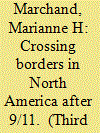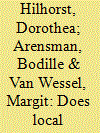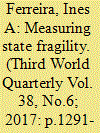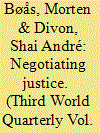|
|
|
Sort Order |
|
|
|
Items / Page
|
|
|
|
|
|
|
| Srl | Item |
| 1 |
ID:
152792


|
|
|
|
|
| Summary/Abstract |
This article is part of a larger project on ordinary border crossings and state practices in North America. The changing border governmentalities in the region focusing on securitising their borders against potential terrorist threats and the increased emphasis on the managing of population flows have led to a reduced mobility for certain travellers as opposed to others. The construction of potentially safe and ‘un-safe’ subjects through profiling on the basis of race, ethnicity, national origin, gender, religion and socioeconomic background and the increasing use of biometrics have impacted upon travellers’ mobilities. In the North American context, the Mexican state has undergone significant modernisation in terms of its border control capacities, thus enhancing not only its capacity as a buffer state, but also its performative sovereignty, and is therefore an interesting case to study. This article aims to analyse how these transformations in border governmentalities have affected the mobility of ‘ordinary’ travellers, and how they have developed coping strategies and resistances towards the potential curbing of their respective mobilities.
|
|
|
|
|
|
|
|
|
|
|
|
|
|
|
|
| 2 |
ID:
152796


|
|
|
|
|
| Summary/Abstract |
In international development, shared ownership is assumed to be a condition for effectiveness. Academic studies question this relation, claiming shared ownership can instead lead to ineffectiveness. This study analysed the interplay between ownership and effectiveness in a transnational advocacy network for conflict prevention observed 2012–2015. Building on recent discussions about balancing unity and diversity in networks, this article unpacks the ownership/effectiveness relationship into three dimensions: collective identity, accountability processes and a shared advocacy message. We find that the question is not about more or less effectiveness, but about the processes shaping the meaning of effectiveness in particular institutional constellations.
|
|
|
|
|
|
|
|
|
|
|
|
|
|
|
|
| 3 |
ID:
152797


|
|
|
|
|
| Summary/Abstract |
This article analyses mining policy as an indicator of a larger question: are some Third World governments starting to steer away from plunder ‘extractivism’ towards a paradigm that prioritises the environment? We begin with the cases of El Salvador and Costa Rica, which have major mining bans in place. We then present the results of our research in which we find five other countries with noteworthy mining-policy shifts: Panama, Colombia, Argentina, Chile, and New Zealand. A sixth country, Honduras under President Zelaya, stands as a recent historical case of how sensitive such a policy change can be. A key take-away from our article is that critical development scholars and practitioners need to look more closely at the mining sector – not simply to analyse case studies of specific mining protests and resistances to extractivism, although these are of course important. Rather, there is a need to investigate policy changes that just might be indications that the era of unquestioning extractivism has ended and that at least some governments are initiating policies to incorporate environmental externalities, policies that suggest a changing development paradigm in the direction of environmental – and concomitant social and economic – ‘well-being’ as envisioned in buen vivir.
|
|
|
|
|
|
|
|
|
|
|
|
|
|
|
|
| 4 |
ID:
152799


|
|
|
|
|
| Summary/Abstract |
The grand narrative of piracy has been instrumental in shaping how piracy off the coast of Somalia is understood and responded to. Self-proclaimed pirates, suspected pirates, and convicted piracy prisoners continue to tell the story of taking up arms against foreign illegal fishers to protect their personal livelihoods as well as Somalia’s natural resources. Although the grand narrative remains the most popular piracy narrative, this paper introduces and examines two newly emergent narratives of Somali piracy – the Somali women’s narrative and the piracy prisoner self-narrative. I explore how these narratives reveal a central paradox surrounding piracy and social reproduction in Somalia that, until now, has been absent from discussions about piracy narratives and the issue of Somali piracy. Whereas the grand narrative of piracy fails to address gender demands and local political economic realities in Somalia, the new narratives present piracy as a gendered experienced that is situated within the broader, evolving context of courtship and marriage in Somalia. I argue the new narratives can help push beyond over-simplistic understandings of piracy off the coast of Somalia as a ‘man’s crime’ that should be addressed by men.
|
|
|
|
|
|
|
|
|
|
|
|
|
|
|
|
| 5 |
ID:
152795


|
|
|
|
|
| Summary/Abstract |
State fragility has become a resonant term in the development discourse over the past decade. In its early days it served as a catch-all phrase used by donor organisations to draw attention to the need to assist ‘fragile states’. In response to the call for a better understanding of how to deal with these countries, there was a surge in measures of fragility. However, it was not long before academics pointed to the murkiness and fuzziness of the term, and identified several caveats to most of the proposals for quantification. This paper reviews existing approaches to operationalise this concept, distinguishing between those that offer no ranking or only partial rankings of fragile states, and those providing ordinal lists of countries. The examination of their theoretical underpinnings lends support to the critical view that most existing approaches are undermined by a lack of solid theoretical foundations, which leads to confusion between causes, symptoms and outcomes of state fragility.
|
|
|
|
|
|
|
|
|
|
|
|
|
|
|
|
| 6 |
ID:
152794


|
|
|
|
|
| Summary/Abstract |
This paper explores the role of media, and in particular Comic Relief plea films (2013), in scripting understandings of poverty and development. The films represent a coding of poverty that is embedded with wider geographical imaginings that essentially abstract knowledge and produce assumptions about particular places that remain premised on hegemonic Global North ideas about the world and how it works. As a result the Global South is often constructed and represented through images that are ambiguous and uncritical, and greatly hamper understandings of everyday life in the South. Through the Comic Relief (2013) films, the paper explores soft understandings of poverty and development, considering Northern complicity in the (re)production of representations and the challenge of constructing causal responsibility through media discourses of problem-solving. This paper unpacks hegemonic Global North scripting of poverty and development through an examination of visual discourses, critiquing the construction of prioritised narratives and, by extension, pointing towards those knowledges that remain silenced.
|
|
|
|
|
|
|
|
|
|
|
|
|
|
|
|
| 7 |
ID:
152800


|
|
|
|
|
| Summary/Abstract |
The plural legal system in post-conflict Liberia expresses tensions between modern and customary institutions. This article seeks to understand how Liberians navigate choices in the plural legal system to address gender-based violence cases. By asking how and why people make the choices they do, we highlight how Liberians solve tensions between institutions, by creating flexible categories that allow them to pursue a course of action that does not compromise their ability to access social networks and resources
|
|
|
|
|
|
|
|
|
|
|
|
|
|
|
|
| 8 |
ID:
152802


|
|
|
|
|
| Summary/Abstract |
UK policies embrace the ideas of security–development nexus, but most scholarship on its engagement builds upon African cases. This paper examines the drivers, nature and implications of UK involvement with an Asian country, Nepal. The UK’s position as the largest bilateral contributor and major peace and security donor among at least 21 others makes examination of its Nepal involvement imperative. This paper uses the grounded theory method and interpretivist analytical approach to create interactions between published and field information. Although the UK’s persistent engagement and programme-based approach helped peacefully manage transition, this paper contends, institutional changes have been shallow and winning confidence remains strenuous
|
|
|
|
|
|
|
|
|
|
|
|
|
|
|
|
| 9 |
ID:
152793


|
|
|
|
|
| Summary/Abstract |
Climate change adaptation refers to altering infrastructure, institutions or ecosystems to respond to the impacts of climate change. Least developed countries often lack the requisite capacity to implement adaptation projects. The Global Environment Facility’s Least Developed Countries Fund (LDCF) is a scheme where industrialised countries have disbursed $934.5 million in voluntary contributions to support 213 adaptation projects across 51 least developed countries. But how effective are its efforts—and what sort of challenges have arisen as it implements projects? To provide some answers, this article documents the presence of four “political economy” attributes of adaptation projects—processes we have termed enclosure, exclusion, encroachment and entrenchment—cutting across economic, political, ecological and social dimensions. Based on extensive field research, we find the four processes at work simultaneously in our case studies of five LDCF projects being implemented in Bangladesh, Bhutan, Cambodia, the Maldives and Vanuatu. The article concludes with a discussion of the broader implications of the political economy of adaptation for analysts, program managers and climate researchers at large. In sum, the politics of adaptation must be taken into account so that projects can maximise their efficacy and avoid marginalising those most vulnerable to the impacts of climate change.
|
|
|
|
|
|
|
|
|
|
|
|
|
|
|
|
| 10 |
ID:
152798


|
|
|
|
|
| Summary/Abstract |
The term ‘Chicago Boys’ remains closely associated with the orthodox neoliberal adjustment implemented in Chile by the Pinochet dictatorship. The conventional portrayal of the Chicago Boys is of a group of US-trained, technocratic economists who institutionalised neoliberal principles and technocratic prerogatives in public policymaking in Chile. This article will contend the Chicago Boys were much more than neoliberal technocrats: they were a revolutionary vanguard that designed and led a capitalist revolution and radically altered the material and ideological foundations of the nation.
|
|
|
|
|
|
|
|
|
|
|
|
|
|
|
|
| 11 |
ID:
152791


|
|
|
|
|
| Summary/Abstract |
The United Nations (UN) peacekeeping operation in Mali (MINUSMA) has become among the deadliest in UN history, suffering from attacks by violent extremists and terrorists. There are strong calls to give UN peacekeeping operations more robust mandates and equip them with the necessary capabilities, guidelines and training to be able to take on limited stabilisation and counter-terrorism tasks. This article conceptually develops UN counter-terrorism operations as a heuristic device, and compares this with the mandate and practices of MINUSMA. It examines the related implications of this development, and concludes that while there may be good practical as well as short-term political reasons for moving in this direction, the shift towards UN counter-terrorism operations will undermine the UN’s international legitimacy, its role as an impartial conflict arbiter, and its tools in the peace and security toolbox more broadly, such as UN peacekeeping operations and special political missions.
|
|
|
|
|
|
|
|
|
|
|
|
|
|
|
|
| 12 |
ID:
152801


|
|
|
|
|
| Summary/Abstract |
European officials veer towards exceptionalism in their policy communications concerning the EU’s global role, particularly in terms of African development. This article poses a rejoinder to such tendencies through examination of the rise of ‘virtuous power Turkey’ in Africa. It examines how Turkish elites constructed a moralised ‘neo-Ottoman’ foreign policy in wake of stalled EU accession. It then underscores how elites framed humanitarian interventions in sub-Saharan Africa in contrast to the perceived neo-colonialism of an EU ‘other’. In this vein, the article explores the meaning of normative ‘neo-Ottomanism’ for ostensible beneficiaries in Africa, for the EU, and for Turkey itself.
|
|
|
|
|
|
|
|
|
|
|
|
|
|
|
|
|
|
|
|
|